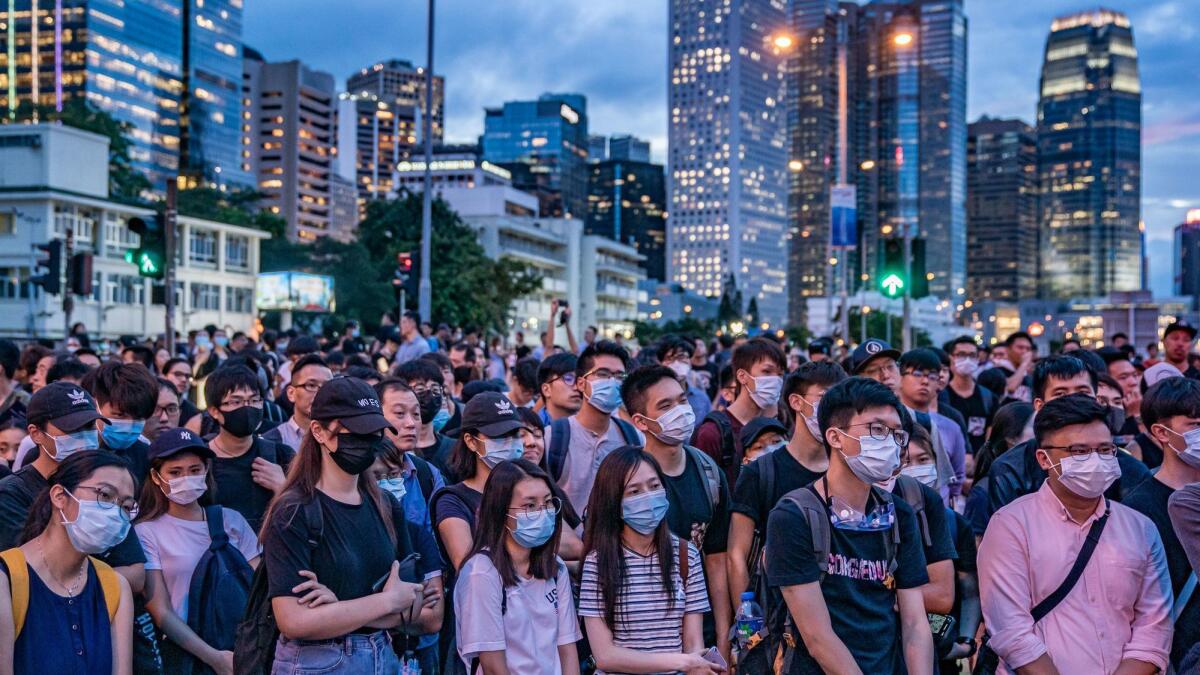The ‘Great Firewall’: China censors videos, social media posts of Hong Kong protests

- Share via
Reporting from Beijing, China — As Hong Kong Chief Executive Carrie Lam offered her latest apology Tuesday over her bungled attempt to push through a controversial extradition law, activists in mainland China busily posted video of the statement — again and again and again.
Each time, though, Chinese censors swiftly took the images down.
Censorship has long been a fact of life in China, where comments conveying dissent, activism or criticism of authorities are removed posthaste from the internet and where access to many Western media and social media sites is banned, in what is sometimes referred to as the “Great Firewall of China.”
In recent days, censors have also been working assiduously to erase content of the Hong Kong rallies, or anything that evokes their spirit. Even a tune that protesters sang during the marches, “Can You Hear the People Sing,” from the musical “Les Miserables,” has been excised from QQ, one of China’s most popular musical streaming sites.
China Digital Times, a California-based website that monitors Chinese censorship, reported that Chinese authorities had ordered media to delete any video related to the Hong Kong protests. The term “Let’s Go Hong Kong” was also censored.
One mainland activist told The Times he stayed awake all night after the two largest mass protest marches, trying to stay ahead of censors by sharing video and photos in mainland social media chat groups — only to see them disappear almost immediately.
Instead, Chinese authorities have portrayed the protests as violent events incited by foreign elements eager to undermine Hong Kong and destroy China’s “one country, two systems” policy, which was meant to ensure Hong Kong’s position as a global financial center by guaranteeing the right to freedom of speech and the right to protest.
Hong Kong, a former British colony, was handed back to Chinese control in 1997 after a prolonged transfer period. The 1984 handover agreement signed between then-British Prime Minister Margaret Thatcher and then-Chinese leader Deng Xiaoping has resulted in a deeply held tradition of peaceful protest in Hong Kong.
But the mass rallies that choked Hong Kong’s streets drew parallels with China’s most sensitive anniversary — the massive Tiananmen Square pro-democracy protests — when memories of the 30th anniversary of the bloody crackdown on June 4, 1989, remained fresh.
Lam’s decision to suspend enactment of the extradition bill Saturday was reminiscent of a protest victory in 2003, when the Hong Kong government was forced to withdraw a law on national security that had ignited similar opposition.
Rather than focus on the two marches that drew more than 1 million demonstrators, China’s Communist Party-owned China Daily focused on a few dozen protesters outside the U.S. Consulate.
“HK parents march against US meddling,” the headline read.
An editorial in the newspaper Monday declared that Beijing’s support for Lam would not waver “in the face of street violence nor the ill-intentioned interventions of foreign governments.” The editorial accused foreign powers of inciting protests with malicious intent and of “sanctimonious posturing.”
Hu Xijin, editor of the Communist Party-owned Global Times, tweeted that the protests would have a negative influence on Hong Kong and lead to more opposition “reliance on street politics.”
“As a developed economy, Hong Kong has seen protesters hit the street too frequently in the past few years. This is not good for the city,” the tweet said.
A Global Times editorial accused U.S. lawmakers of using Hong Kong to pressure Beijing by inciting “fake” complaints among Hong Kongers.
“This is a stark provocation,” the editorial said, adding that U.S. lawmakers “make us see the dark mind of the U.S. political elite who just want to turn Hong Kong into a chaotic place by hyping the uncontrolled violent street politics.”
It said that after Britain handed Hong Kong back to China, “the U.S. continued to interfere in Hong Kong’s affairs. This shows their dark mind-set: If Hong Kong does not belong to the West, turn it into China’s problem.”
But interest in the Hong Kong events has remained high in China despite the ban, according to FreeWeibo, a site that circulates censored material.
Censorship of the Hong Kong protests follows strenuous efforts about two weeks ago to erase all mention of Tiananmen, commemorated at a mass candlelight vigil in Hong Kong and reported on widely around the world.
One popular blogger who goes by the handle V2 wrote on June 6 about the “elephant in the room” — referring to the censorship of discussion on Tiananmen.
“Some people, including me, were silenced, while the rest were excited to talk about celebrities smoking, getting married, getting divorced or cheating, pretending that all these topics are really worth discussing,” V2 wrote, according to “What’s on Weibo,” a website that tracks popular posts on the Chinese microblogging site. “The truth is that these are the only topics that are allowed to be discussed.”
Compared with social media elsewhere, China’s Weibo was like “a crowded place within a tiny snail shell,” the blogger lamented.
Hong Kong’s leader faces pressure to resign. Will her replacement be any better? »
More to Read
Sign up for Essential California
The most important California stories and recommendations in your inbox every morning.
You may occasionally receive promotional content from the Los Angeles Times.













